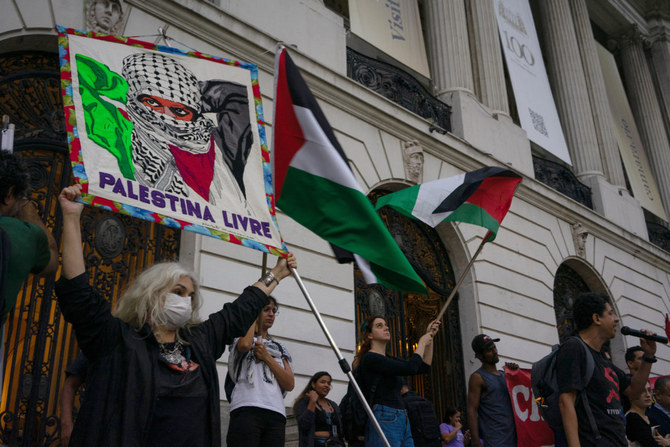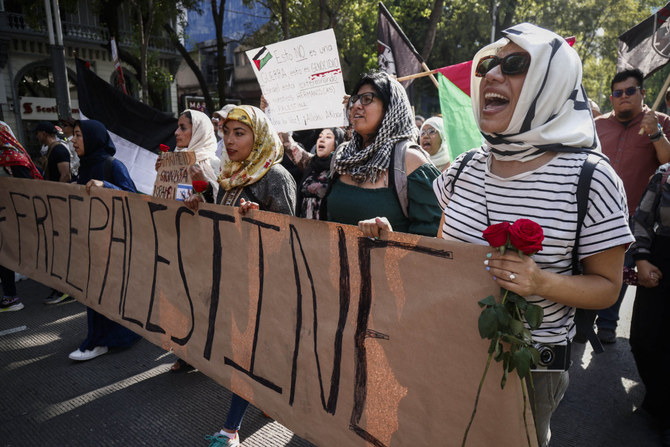SAO PAULO: With large Palestinian communities and historical ties with the Levant, many Latin American countries have been following the Israel-Hamas war with close attention.
In nations like Brazil, with as many as 70,000 Palestinians and their descendants, and Chile, with more than 500,000 Palestinians, people have been receiving information about the conflict not only through the press, but also from Palestinian Latin Americans who live in Gaza and the West Bank.
One of them is Hasan Rabee, a 30-year-old shop owner who lives in Sao Paulo, Brazil’s largest city. About a month ago, he traveled to Khan Younis in Gaza, along with his wife and two daughters, to visit his family.

Hasan Rabee, a 30-year-old shop owner in Sao Paulo, traveled with his wife and two daughters to Khan Younis in Gaza about a month ago to visit his family. Now they are trapped in the war. (Supplied)
Then the war broke out and they have not been able to leave the region since. Rabee has been posting videos and information on the Israeli strikes on social media every now and then. Some of them have been aired by Brazilian TV stations.
“As I talk to you, bombs are exploding, can you hear? It is especially strong during the night. My daughter runs to the window and shuts it down when she hears anything. She thinks we will be protected this way,” Rabee told Arab News.
FASTFACTS
Argentina, Brazil, Chile, Colombia and Uruguay host a large Palestinian diaspora.
Brazilian nationals in Gaza are receiving aid from their embassy, but cannot leave.
Palestinian Latin Americans in the West Bank say they are determined to remain.
Rabee says the children are petrified and his wife has begun taking pills to help control her nerves. His mother meanwhile is suffering from spikes in her blood pressure. Many relatives have joined them in their small apartment. Nobody can sleep at night due to the bombs.
“The power was cut 20 days ago. At times, we go to a guy who owns solar panels and pay him to charge our batteries,” said Rabee. The water arrives at the building once a week without enough pressure, so they have to go down, fill some bottles, and take them upstairs.

Rescuers communicate with each other as they sift through the rubble of a collapsed building following an Israeli air strike on Rafah in southern Gaza Strip on October 26, 2023. (AFP)
Given that he is a Brazilian citizen, Rabee is receiving food from the Brazilian embassy in Palestine. The Brazilian government has established a plan to take a group of citizens from Khan Younis and Rafah through the border with Egypt.
“All we want is to leave for Brazil. But Israel does not open the border,” he said. Rabee wishes to take his mother with him to South America. He hopes the Brazilian government will allow him to do so.
In a number of interviews with Brazilian journalists, Rabee denounced the killing of civilians in Israeli strikes. “For me, that is a war against the children. Thousands of them have been killed. I cannot understand how something like that is happening,” he said.
While the West Bank is not being targeted by Israeli strikes, the number of attacks against Palestinians in the region has grown since the war broke out, according to Latin Americans who are in the region.

Palestinians search for survivors and the bodies of victims through the rubble of buildings destroyed during Israeli bombardment in Khan Yunis, Gaza Strip, on October 26, 2023. (AFP)
“With the strikes on Gaza and the international support that Israel is getting, the Israeli settlers in the West Bank have been feeling more empowered to act with violence against Palestinians,” Estefania Vega, a Mexican actress who is monitoring the human rights situation in the region of Hebron, told Arab News.
Vega obtained a scholarship from the Mexican government for a three-month internship with the Freedom Theatre, a community-based theater in Jenin. She arrived on October 2, but had to leave Jenin on October 8 for safety reasons.
Since then, she has been working with a human rights organization that accompanies Palestinian villagers who are at risk. The idea is to visit families who were harassed or attacked by settlers or the military, film every act of violence, and denounce it to the international community.

Estefania Vega, a Mexican actress who is monitoring the human rights situation in Hebron, West Bank, has a scholarship from the Mexican government for a three-month internship with the Freedom Theatre, a community-based theater in Jenin. (Supplied)
“Last week a settler got into a village and shot a young man in the stomach. He wanted to shoot everybody,” said Vega.
She has been monitoring the events in Wab Sik, a village in the region of Ramallah, and Tawani, near Hebron. In both of them, officers have been randomly attacking houses, breaking local infrastructure like solar panels, and threatening people.
Last week, Vega was inside a house that had been attacked, surrounded by toddlers and women, when nine officers stormed in. They heard that she and her Irish colleague had a camera and asked them to give it to them. But other activists had taken it to another village earlier that day.
“They grabbed and destroyed our phones and asked us why we were there. We told them that they were the ones who had no right to be in Palestinian territory. So, an officer answered to me that I should go back to my country now, otherwise I would go back in pieces,” she said.

Estefania Vega, a Mexican actress, says she had personally seen and experienced Israeli violence while observing the human rights situation in the occupied West Bank. (Supplied)
Vega intends to remain in the West Bank until January and then try to leave through Jordan. “Every foreigner is leaving. If they remain alone, nobody will tell their stories,” she said.
Many Latin Americans live in the West Bank, especially Palestinian Brazilians (estimated at 6,000 people) and citizens from Colombia, Argentina, Chile, Uruguay, and other nations.
Some of them have been trying to leave Palestine since the war broke out, including a Palestinian Chilean who tried to get a rescue flight to Santiago in Tel Aviv but was forbidden to do so by the Israeli government.
Most of the Palestinian Latin Americans, however, are attached to Palestine and do not want to leave.
That is the case with Ruayda, a Palestinian Brazilian who did not want to provide her surname owing to security concerns. She lives in the region of Ramallah, taking care of her great-grandfather’s land.
“I am not a foreigner. The Israelis are. I am not leaving by land,” she told Arab News.
It is time for the olive harvest, Ruayda said, and whole families are involved in gathering the crop. The Israeli settlers know that and have been shooting people and cattle.
“In our city, a boy was shot right on the first day of harvest. He lost part of his liver and is in ICU,” she said. In Jenin, she says Palestinian Brazilians have also been shot. That is why she worries about her 14-year-old son.
“He is not going to school because it is closed. I would send him to Brazil if it was possible. We spend 24 hours a day with fear of being shot by one of those maniacs,” Ruayda said.
Palestinian Colombian Samia, who also preferred not to provide a surname, has lived near East Jerusalem since 1977. She said there is an atmosphere of anguish across the whole region.
“I wake up in the night with great anxiety and come to the living room to watch the news,” she told Arab News.

Colombian army soldiers load humanitarian aid at the Dorado International Airport in Bogota on October 25, 2023, for Palestinian people affected by the war between Israel and Hamas. (AFP)
Clashes between the youth — carrying rocks — and armed Israeli soldiers have been constant, Samia said. Some of her friends have lost relatives. She fears for her adult daughters, who live nearby.
“There is a cumulation of traumas among us. Unfortunately, there are not enough mental health centers here,” she said.
Samia considers Colombia to be her motherland, but she thinks she cannot leave Palestine. That is also the case with Brazilian Palestinian Ruayda.
“We fear they will launch another ethnic cleansing operation,” she said. “That is a new Nakba. We cannot leave Palestine.”































